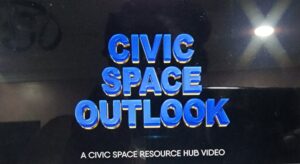At a colorful screening ceremony held in Dakar, Senegal, on December 5, 2023, Spaces for Change launched the civic space forecast documentary, titled, Civic Space Outlook in Senegal. The documentary shines a light on the civic space climate in Senegal ahead of the country’s 2024 presidential elections. It examines the trends, drivers, and impact of the shrinking civic space in Senegal and provides early warning signals for civic actors working to defend the civic space in the country. The screening, held under the banner of the Ford Foundation-backed Civic Space Resource Hub for West Africa, was attended by civil society organizations (CSOs), journalists, media representatives, protesters, and other civic actors who play an active role in defending the civic space in Senegal.
The analysis of civic space trends in West Africa curated on the Closing Database identified elections as a major trigger for crackdowns on the civic space in the subregion. Across West Africa, evidence shows that clampdowns on civic freedoms soar during election periods. As Senegal heads to the polls in February 2024, escalating tensions have permeated the nation resulting in deadly riots, internet shutdowns, and the recession of democratic freedoms. So far, the criminalization of protests and digital closures have been documented. New counterterrorism clauses inserted into the country’s Criminal and Penal Codes have been routinely invoked to target activists, journalists, and protesters. The Outlook examined these developments and issued early warning signals to civic actors to proactively counter the rising threats to civil liberties.
The discussions at the screening shed light on new drivers of shrinking civic space in Senegal like the recent discovery of oil and gas and the accompanying dissatisfaction with benefit-sharing mechanisms in the resource-rich areas. During the panel discussion on the role of civil society in maintaining democratic stability in Senegal, stakeholders unanimously agreed that forging partnerships with local and transnational allies is the first step CSOs should consider. There is an urgent need for civil society organizations in West Africa to unite in responding to repressive trends across the region. If West African governments are copying bad practices from each other to silence activists and stifle freedoms, there is no reason why CSOs should not come together as well to counter these attacks. While acknowledging that collaboration is the way to go, several challenges hinder its effectiveness. Limiting factors include the unequal focus and distribution of donor resources in the region and the polarizing political temperatures in Francophone and Anglophone countries.
Another important strategy for pushing back against incessant crackdowns on the civic space is collaboration between CSOs and the media. This partnership is important because CSOs and journalists are exposed to similar risks and threats perpetrated by the same set of actors. Collective action is therefore imperative to maximize impact. And action produces greater impact when taken proactively rather than reactively. CSOs were urged to get involved in policymaking and demand a seat at the table when laws are being made rather than clamoring for repeals or amendments after the laws have been passed. On the other hand, journalists must courageously uphold their responsibility to investigate atrocities and tell powerful stories that have the potential to inspire reforms and social change.





















